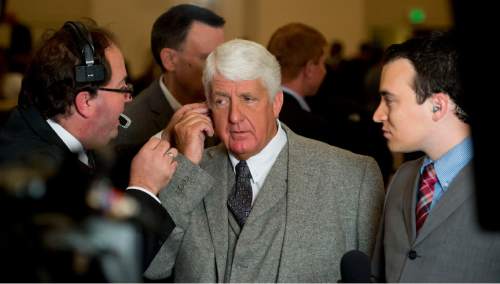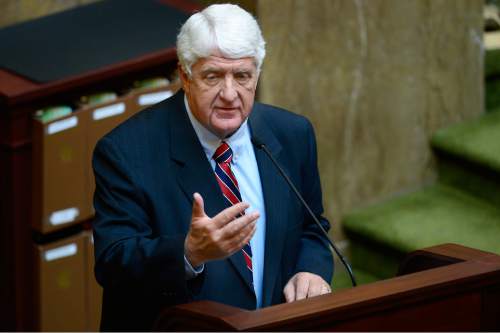This is an archived article that was published on sltrib.com in 2015, and information in the article may be outdated. It is provided only for personal research purposes and may not be reprinted.
Washington • Congressional negotiators have stuck a renewal of the Land and Water Conservation Fund into a massive spending package expected to be approved Friday.
Rep. Rob Bishop, R-Utah, caused an uproar when he held up a bipartisan-backed reauthorization of the popular program. He isn't too happy about its inclusion in the omnibus spending bill, but he says the renewal at least comes with some changes he sees as important for the 50-year-old fund created to preserve and protect national parks and forests, areas around rivers and lakes, parks and trails. The fund will now split half its money between grants to states, and half will go toward federal purchases.
"We got some reforms, and that's what we were trying to push for," Bishop said in an interview Thursday. "And that reform was big because the Interior Department was saying 'to hell with any reforms, we're perfect right now.' It's not. So the reform is good. That's kind of a win, but it's not a win."
Bishop in September had blocked legislation to renew the LWCF, arguing it was giving far too little to state grants while allowing the Interior Department to buy more land. The Utah Republican argues that the federal government doesn't need more land when it has a multibillion-dollar backlog in maintenance on the acreage it already owns.
He had proposed legislation that would have severely restricted land acquisition in the West and would have carved out part of the fund for training and education of oil and gas industry workers.
The $1.1 trillion spending bill, which the House and Senate are slated to approve Friday to keep the government running until September, included a slew of riders meant as sweeteners to rally support. The LWCF enjoys broad support in Congress, though legislation to renew it hadn't made it out of committee. The spending bill brought it back to life.
Bishop said he's not sure how the LWCF reauthorization made it into the package, but he blasted the process because it sidelined his committee's efforts to reshape the program and did so through an appropriations bill versus stand-alone legislation.
"That's the wrong form, it's an incredibly wrong form, it's an embarrassing wrong form," Bishop said.
The renewal authorizes the program for three years with $450 million in funding for next fiscal year. The bill, Bishop noted, prohibits the government from using LWCF funds to buy land through eminent domain, and more money will flow to states to divvy up.
Conservation groups gave mixed reaction to the LWCF's inclusion in the spending package. While happy to see it renewed, and with $100 million more in annual funding than usual, several groups said it should have been permanently authorized and not just for three years.
"Strong bipartisan support for the LWCF overcame fringe elements in the Senate — and House Natural Resources Chairman Rob Bishop — to do the right thing for conservation and public access," Backcountry Hunters & Anglers President Land Tawney said this week.
"Unfortunately this provision is like getting a bike for Christmas with no air in the tires. Congress had the opportunity to do the right thing for LWCF once and for all but failed to move language already developed that would permanently reauthorize one of our nation's most historic, successful conservation programs."
David Jenkins, president of Conservatives for Responsible Stewardship, said the short-term renewal was essential to safeguard parks and outdoor recreation but wouldn't end the threat Bishop poses to the LWCF in the long run.
"Congress needs to follow the wishes of a bi-partisan majority by permanently reauthorizing LWCF and foreclosing Bishop's opportunity for further mischief," Jenkins said.
For his part, Bishop says he's not sure if he'll proceed with legislation he unveiled to overhaul the LWCF now that the fund is set for three years.
While the current renewal of the bill has no limits on where the LWCF can be used to buy land, Bishop's legislation caps new purchases to 3.5 percent of the fund and allows only 15 percent of that portion to be used in the western United States.
Bishop said he's weighing options now on what do with his bill but he says he won't drop his efforts to change the LWCF.
"It is not moot for three years," Bishop said. "Whether I proceed with the bill or not, it is not moot for three years."





